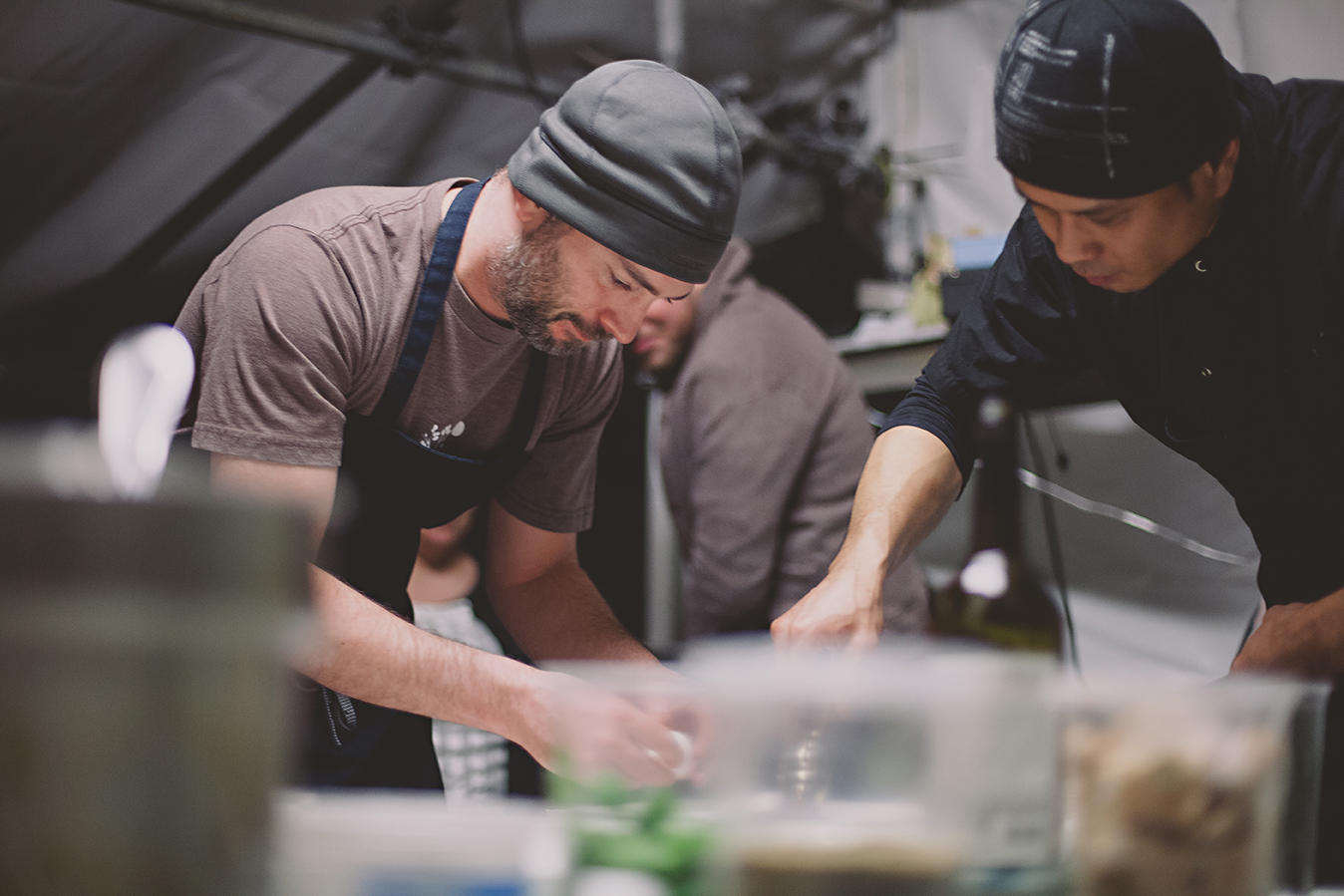Photo above: Diversity Food Services chef Ben Kramer, “I’d rather buy raw food and pay people to process it.”
Ben Kramer never thought he would end up working in a cafeteria kitchen.
The chef started his career at Vancouver restaurants that catered to a clientele willing to pay top dollar for fresh and local food. When he moved to Winnipeg in 2000, he brought that locavore philosophy with him. From 2006 to 2009 he was the head chef at the critically-acclaimed Dandelion Eatery, where he developed a reputation for local, organic fare. At the time, he says, very few people were emphasizing this, making him “the weird one in Winnipeg.”
It was this reputation, though, that made him an ideal candidate to help lead a new experiment in campus cafeteria food that the University of Winnipeg launched five years ago on the heels of scathing student reviews of the school’s food. (“Even the poutine was bad,” then-president Lloyd Axworthy told the Globe and Mail. “We were at the very bottom.”)
Axworthy decided to buy out the existing contract with a large multinational catering firm, and in June, 2009, the university created its own arms-length food services company called Diversity Food Services — a joint venture of UW’s Community Renewable Corporation and SEED Winnipeg Inc., a local non-profit focused on employment and economic development.
In July, the team asked Kramer to come on board as executive chef. His mandate was to help develop a business plan that prioritized food quality and sustainability.
“The way I saw it, it was a new challenge because everyone told me it’s not possible to do what we’re doing,” says Kramer. “Immediately, I thought, let me show you.”
Today, Diversity Food Services runs two cafeterias and a coffee shop on campus, along with a fine-dining restaurant and a catering branch that services high-profile events in the city like the Truth and Reconciliation Commission and the G8 Interfaith Summit.
What makes Diversity different, says Kramer, is that it takes a restaurant approach to institutional food. Instead of working with three or four large suppliers, he works with close to 100. These include small-scale wholesalers and individual farmers themselves. “So rather than making one phone call, I have to make 10,” he says. “Everything we do is more work, but it’s intentional.”
Its staff of approximately 80 is made up of new immigrants and inner-city residents whose challenges to employment are met with skills-training. Scratch cooking is king; staff do some butchering in house, smoke their own bacon, and spend summers canning fresh produce to use all year round.
“Pretty much the only processed stuff we buy is ketchup and mayonnaise,” says Kramer. “I’d rather buy raw food and pay people to process it – I’d rather that money stayed in the economy and went towards people and training, then towards Kraft.”
Kramer and his team have won numerous awards since 2009, including the Manitoba Excellence in Sustainability Award; the ‘Golden Carrot’ award from Food Matters Manitoba; and, in 2010, the Iron Chef Winnipeg competition. One of the biggest challenges, says Kramer, has been trying to keep up with demand on the catering side. “We grew a lot faster than we anticipated.”
Although he might not have imagined himself as an institutional chef, this position has allowed Kramer to have “a whole different impact.”
“I’d been cooking in restaurants my whole life and from a clientele point of view, I was just preaching to the choir. . . selling to people that are already bought in.”
At Diversity, he can introduce ingredients like northern pike and chanterelle mushrooms to a wider range of people. He’s also able to have more influence on the supply side.
“We do an enormous amount of volume which in turn allows me to choose where our money is going, and support local farmers instead of big companies. That kind of stuff has a huge impact on the local economy.”
He says that what Diversity Food Services has accomplished at the University of Winnipeg is possible anywhere – if there’s the will, there is a way. “You have to decide that you want to do it, and commit to it, and do it,” says Kramer. “It’s a matter of priorities.”
The views expressed in this article do not necessarily reflect those of Farm to Cafeteria Canada.





